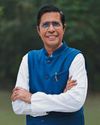
India’s efforts to enter the global semiconductor chip manufacturing domain got a shot in the arm this year when US-based chipmaking giant Micron Technology began the construction of its $2.75 billion semiconductor plant in Sanand in Gujarat.
While Prime Minister Narendra Modi’s followers hail him for his enthusiasm in trying to make India a global semiconductor manufacturing hub, the role of his trusted lieutenant, Union minister of electronics and information technology Ashwini Vaishnaw, has not gone unnoticed.
Vaishnaw is unlike most other Union ministers before him. When he took charge at the Ministry of Electronics and Information Technology (MeitY) in July 2021, he had been a parliamentarian for barely two years. Neither did he have any ministerial experience, nor did he have much sway within the Bharatiya Janata Party (BJP). After all, he joined it only after receiving the Rajya Sabha nomination from Odisha in 2019. He was elected unopposed to the upper house, thanks to the support from the Biju Janata Dal.
Vaishnaw brought to the table at MeitY his decadeplus experience as a bureaucrat, coupled with his Ivy League pedigree and familiarity with global corporate structures. He completed M.Tech from IIT, Kanpur, and joined the Indian Administrative Service in 1994 as an Odisha cadre officer.
By 2003, he was walking in the highest corridors of power when he joined the office of then prime minister Atal Bihari Vajpayee as a deputy secretary. Later, he took a hefty loan to pursue MBA at the Wharton Business School in the US. On his return to India, he exited civil service and took up top managerial roles in multinational corporations like General Electric and Siemens one after the other. Before eventually making his foray into politics, the Jodhpur-born engineer even had entrepreneurial stints in Gujarat.
This story is from the December 2023 edition of Outlook Business.
Start your 7-day Magzter GOLD free trial to access thousands of curated premium stories, and 9,000+ magazines and newspapers.
Already a subscriber ? Sign In
This story is from the December 2023 edition of Outlook Business.
Start your 7-day Magzter GOLD free trial to access thousands of curated premium stories, and 9,000+ magazines and newspapers.
Already a subscriber? Sign In

From Chandni Chowk to Global Recognition
For Manish Aggarwal, director at Bikano, Bikanervala Foods, the family business was not just a responsibility but a passion he took to the global stage

Spotting AI Scams
Al has become an integral part of our lives, from customer service no insurance claims. But it is also becoming a tool for fraudsters who use it to scam individuals and corporations

Let a Hundred Flowers Bloom
On the banks of the Ganges in industrial Kanpur, a start-up has blossomed that turns waste flowers into incense

BATTERY LOW
India produces enough green energy to power many of its largest cities yet lacks the storage to use it efficiently. A nation blazing forward must leap ahead in battery technology to stay on course

We Have Everything Going for Rajasthan
Rajyavardhan Singh Rathore, Rajasthan’s industry and commerce minister, tells Pushpita Dey why the state is suited to become a hub for investments.

Dairy and Other Dilemmas
India’s refusal to open its dairy market has complicated trade negotiations for years. As global partners demand concessions, is the cost of protectionism outweighing benefits?

Riding in a Maze
As gig workers ride into an uncertain future with little more than a smartphone and a bike, the government is struggling to arrange a socialsafety net. But millions without social security is recipe for disaster

BIRLA'S BIGGEST BATTLE
As Kumar Mangalam Birla completes 30 years at the helm of the Aditya Birla Group, he has a battle to defend his businesses and conquer new ones

THE INNOVATION LEAP
India dreams of becoming a product nation. But unless the corporate sector significantly increases spending on R&D, the country will continue to lag behind global peers

EDUCATION BUDGET MUST DOUBLE EVERY 3 YEARS
Veezhinathan Kamakoti, a renowned academic and director of Indian Institute of Technology Madras, tells Deepsekhar Choudhury on what technology sovereignty means for India and how it can propel the country towards its vision of becoming a developed nation by 2047.